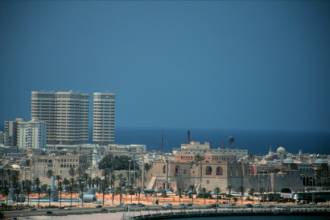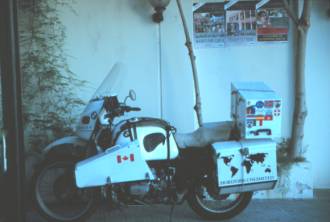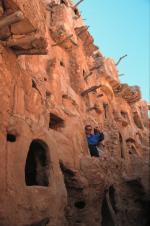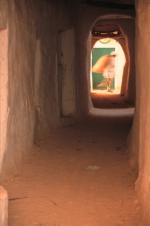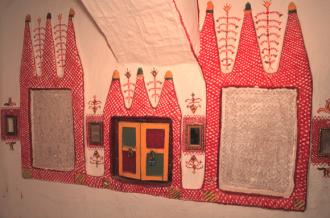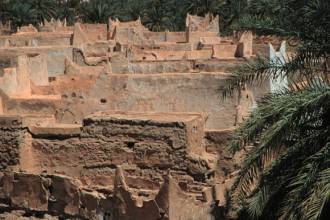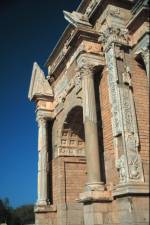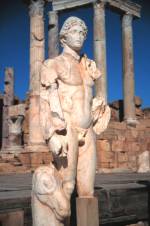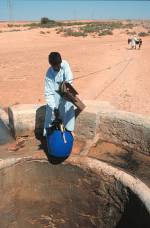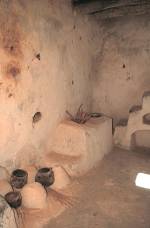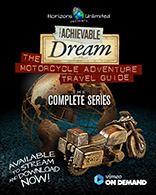Grant and Susan in Libya
May 4, 1997 - Tripoli, Libya
We crossed the Tunisia-Libya border at mid-day yesterday, our tour guide Sharif (speaks English, French, German, Italian, Turkish and Arabic) met us when we finished with the Tunisian side, and shepherded us through the Libyan formalities very smoothly. That afternoon we saw some Roman ruins at Sabratah, then on to Tripoli late afternoon. It's just as well we had an escort, the road signs are all in Arabic only, so we would have been hard pressed to find anything.
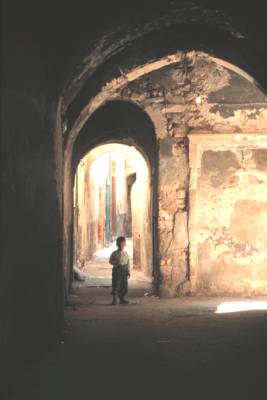
Boy in archway, old town of Tripoli
Sunday we walked all day exploring Tripoli. Sharif is a good guide, we spent a couple of hours at the Tripoli Museum, then walked through the Old Town, had lunch at a small restaurant then continued walking around and taking pictures this afternoon. I guess you could say we've done Tripoli now.
We found in the old city that kids especially just love to get their picture taken. People along the street say "hello" and "where are you from?", then "welcome to Libya". Everyone is very friendly.
As we were leaving the museum, we met a Canadian couple with kids and a friend - from B.C., they are living in Libya teaching English as a second language in the south. They have been here 4 months, and might stay longer but said they had to renegotiate their contract - it was "good enough to get us here, but not good enough to convince us to stay". So, there are Canadians here. They weren't supervised. I guess when you have a residence permit you can come and go as you please. At a hotel where we stopped for tea, one of Sharif's friends asked me how long our visa was for. When I said 30 days, he remarked that, as a Libyan, he couldn't get a visa at all for Canada. So, the likelihood is some of the difficulty in our getting a visa for here is tit for tat.
Tripoli, old town to right and 'coke bottle' office buildings on left
Libya is officially an Islamic Socialist Republic (think about that for a minute). It doesn't seem very socialist now, although they do have free medical care. I understand that small business is mostly private, but big enterprises, including the oil companies and banks are all still government owned. We got some great propaganda poster shots about U.S. sponsored terrorism (the bombing of Libya by Reagan in 1986), and for a souvenir I thought I might pick up an English copy of Qaddafi's "Green Book", which is the Libyan equivalent of the sayings of Chairman Mao, since Qaddafi is known as the country's "leader-thinker". Just kidding, I probably would get in trouble mailing it home.
Bike in front of propaganda poster, Hotel El Kabir, Tripoli, Libya
Tripoli is somewhat more interesting than Tunis, as capital cities go. The biggest problem from a tourism point of view is garbage, which seems to be tossed everywhere there is a space. They really need a cleanup campaign badly.
May 8, 1997- Back in Tripoli (after Ghadames oasis)
We have just finished our first (and hopefully last) experience as prisoners in a tour bus for three days with four other tourists (2 young Swiss couples who mostly spoke French). The 3 day trip to the oasis town of Ghadames was actually 1 day in Ghadames and 2 very long days in a VW bus with hopelessly inadequate air conditioning for the climate, driving on roads which occasionally were drifted over by sand and whose surface was bad enough to blow out one tire each way on the trip (mostly the fault of poor tires). The going was slow as a result, speed is also reduced by the need to avoid recalcitrant camels (common as kangaroos in Australia or sheep in New Zealand) who had to be honked at to get them to move off the road, which they did at a very leisurely pace, although the young ones virtually bounced away.
Susan in abandoned storage room / caves at Nabul, southern Libya | Ghost in the old town of Ghadames, southern Libya |
Ghadames is at the southern corner of Libya, where it borders with Tunisia and Algeria. The geography is desert, and during the day the temperature was up to 32 C but very dry, and not much cooler at night. Can't imagine how hot it will be in summer. The people in the south have mastered the art of building houses to keep cool, though, and it was usually very pleasant inside. The old city of Ghadames was fascinating, primarily for its architecture, which is hard to describe, so you'll have to wait for the pictures.
Traditional painted walls in Ghadames, southern Libya
However, the length of time needed to get there and back is excessive, and since there are no possible stopover points on the way to break up the trip, I'm not sure how they could improve the schedule. But, it has reinforced our belief that traveling with our own vehicle is the way to go, as we probably would have stayed more than one day once we got there.
Roofs of houses in Ghadames, southern Libya oasis town
For the last couple of years Libya has been officially promoting tourism in an effort to start diversifying an economy primarily based on oil. But, the tourist facilities are pretty limited, and way behind Tunisia in both quantity and quality of services. And the level of garbage - staggering - we found in Tripoli has been typical in the rest of the country. We plan to write a letter to Qaddafi and give him our thoughts on what they need to do to attract tourists who will recommend Libya as a destination to other tourists. Of course, we'll wait until we're safely in Egypt to do that!
One interesting point is that, after looking fruitlessly in both Spain and France for peanut butter, we found it in Libya in a small store on our way south - made in USA, of course. So much for sanctions. The only sanction which would really have an economic effect on Libya would be to not allow them to export oil, but since both Italy and Germany depend on oil from Libya, that's not going to happen.
Tomorrow we head to Leptis Magna with our escort. We've gotten to know Sharif pretty well over the last few days, and we're pretty comfortable with him now, which is good since we've still got another 5 days with him before we get to the Egyptian border.
May 15, 1997 - from Marsa Metrouh, Egypt
We left Tripoli on Friday afternoon, and spent a few hours at Leptis Magna, which is a really impressive Roman ruin, claimed to be one of the best preserved anywhere in the world (it was covered by sand for centuries until discovered and excavated in the 1950's.)
Arch of Septimus Severus, Leptis Magna Roman ruins, Libya | Statue in the Law Courts theatre at Leptis Magna Roman ruins, Libya |
Then we continued on to Misurata to our hotel. Saturday was a marathon day, we covered 820 km driving from 9:00 am to 1:00 a.m. the next day! Although the mileage was planned (there isn't any decent accommodation between Sirte and Benghazi), it wasn't supposed to take quite that long. But a flat tire on the truck combined with the jack not working meant a fairly lengthy tire change, and of course we found a couple of things to photograph on the way, including some men using a donkey to haul one bucket of water at a time out of a well, which they poured into a trough to water their herd of sheep and goats.
Sunday morning we were totally exhausted, slept in until almost noon and didn't get on the road until 3:00 p.m. out of Benghazi. Parts of Benghazi were really attractive, but the ever-present garbage spoils the view for us, although we got the impression the locals don't notice it at all. From Benghazi we drive to Cyrene, which is a Greek ruin and also quite extensive. Monday morning was spent touring Cyrene, then Monday afternoon we drove to Tobruk, which is a truly uninteresting place unless you're keen on WW2 history. There are cemeteries and memorials in the area for the French and German and Commonwealth war dead (the Italians repatriated all theirs). So we were taken to the German and Commonwealth ones on Tuesday morning before heading to the border (they would have shown us the French as well but we didn't want to get to the border too late).
So, we survived Libya, and even discovered that the Libyans don't all eat babies or carry submachine guns and bombs! The people everywhere were actually very friendly, and we certainly felt very welcome. Not sure if the reaction would have been the same if we were Americans, but they seem to like Canadians. And, there are so few tourists of any nationality there that we would have been a curiosity no matter what. People were constantly waving at us, truck drivers leaned out of their windows to wave, cars blinked their lights, children shouted hello as we drove past, it felt like we were famous or something! What we were was rare and obviously foreign. In fact, we only saw ONE other motorcycle in the entire country (not even mopeds!), and that was a police motorcycle. So, you could say we were pretty conspicuous. We certainly didn't worry about the bike itself being stolen, who would they sell it to? Also, since there are checkpoints literally every 40 kilometers all the way across Libya, I don't think anyone would get very far with a stolen motorcycle.
We were only asked for our passports once in all the checkpoints, but it's hard to say what would have been the case without Sharif in front with the truck to explain us to them. He often gave them yet another copy of what Grant thinks was our permits, although he wouldn't admit that was what it was. He didn't like the checkpoints any more than we did. Interestingly, there were no checkpoints at the military installations, which are numerous, but rather the checkpoints were placed at the entrance and exit to all the towns, as well as intersections on the highway. They are clearly designed to be control of the civilian population rather than a military security thing.
We didn't get to do scuba diving, although we went out twice. The weather was not cooperating, and the locals (big husky guys all) decided the surf was too rough for the shore dive they had planned. So I (Susan) accused them of being wusses but acquiesced reluctantly. Ha!
We stayed mostly in top-class hotels, which are all owned by the government, as there is no private sector investment in any large hotels. The hotel rooms were very cheap, about 75 dinars or US$25.00 per night in the good hotels. Food also was pretty cheap, and universally very good. The hotels were certainly up to the standards of Tunisia or even Europe, and in fact the food was generally better than in Tunisia. Neither of us have had any tummy trouble since leaving Tunisia.
As a bonus for overland travelers, Libya has the cheapest gas in the world, about US$0.15 (15 cents) per gallon! It was $1.50 for an average fill, compared to Europe's $30-$35.00 per tank.
Our consensus is that the good things about Libya are the Roman and Greek ruins, which are in excellent condition, and the people, who are really friendly. The bad things are the checkpoints and the toilets, which are generally awful anywhere except the top-class hotels (although not appreciably worse than the non-tourist toilets in Tunisia).
Although we were pretty unenthusiastic about having to be escorted through Libya, I must admit that the escort does add a lot of value. As there are no road signs except in Arabic, no signs for hotels or restaurants (except in Arabic, and no international symbols of any kind), and certainly no signs for attractions (except in Arabic), as an independent traveller you would be hard pressed to find anything! We could have driven right past many of the interesting Roman ruins such as Leptis Magna and never known they were there. Also, in the cities, finding places to stay and eat would be much more effort. Finally, my best guess is that the checkpoints would have been a major nuisance if we were unescorted.
At one point we got separated from Sharif, and were just waved through three checkpoints, but that was a fluke, they were too lazy to get out of their seats and were waving everybody through. Sharif himself was a bonus because his English was good, and he seemed to know just about everyone in Libya! I'm sure we got better service as a result. And even at the Libyan side of the Egyptian border, he smoothed our way through the exit formalities so we got through quickly.
However, the Egyptian side of the border was a whole other story...
Member login
Announcements
Thinking about traveling? Not sure about the whole thing? Watch the HU Achievable Dream Video Trailers and then get ALL the information you need to get inspired and learn how to travel anywhere in the world!
Have YOU ever wondered who has ridden around the world? We did too - and now here's the list of Circumnavigators!
Check it out now, and add your information if we didn't find you.
Are you an Overland Adventure Traveller?
Does the smell of spices wafting through the air make you think of Zanzibar, a cacophony of honking horns is Cairo, or a swirl of brilliantly patterned clothing Guatemala? Then this is the site for you!
Hosted by Grant and Susan Johnson, RTW 1987-1998
Johnson's Home
Who Are We?
The BIKE Story
Press Stories about us
Our "Rules of the Road"
Photo Album 500+ images
"Quick" highlights -
Top 31 photos
Mexico
Central America
New Zealand
Australia
Europe
England
Isle
of Man
Norway
Sweden
Denmark
Germany
Netherlands
Spain
Gibraltar
Africa
Tunisia
Libya
Egypt
Kenya
Tanzania
Malawi
Zimbabwe
Botswana
Namibia
Caprivi Strip
Etosha
Sossusvlei
South
Africa
South America
Argentina
Tierra del Fuego
Chile
Peru
Ecuador
Colombia
Next HU Events
HU Event and other updates on the HUBB Forum "Traveller's Advisories" thread.
ALL Dates subject to change.
2024:
- California: April 18-21
- Virginia: April 25-28
- Germany Summer: May 9-12
- Québec: May 17-19
- Bulgaria Mini: July 5-7
- CanWest: July 11-14
- Switzerland: August 15-18
- Romania: August 30-Sept 1
- Ecuador: August 24-25
- Austria: September 12-15
- France: September 20-22
- Queensland is back! Oct 4-7
- Germany Autumn: Oct 31-Nov.3
- South Africa: November
Add yourself to the Updates List for each event!
Questions about an event? Ask here
HU Achievable Dream is Online
and available now to stream on Vimeo!
ALL 15 chapters of the HU Achievable Dream Guide are available to download on Vimeo!
Binge watch over 18 hours of inspiring, informative and entertaining stories and tips from 150 travellers!
"a cross between entertaining stories, tech tips, and reference guide"
"A timeless introduction to Motorcycle Adventure Travel!"
Originally launched as a 7 DVD set, The Achievable Dream series can now be downloaded anywhere. OVER 18 hours of solid info take up zero space in your panniers. How convenient!
Books

All the best travel books and videos listed and often reviewed on HU's famous Books page. Check it out and get great travel books from all over the world.
NOTE: As an Amazon Affiliate we earn from qualifying purchases - thanks for your help supporting HU when you start from an HU Amazon link!


















